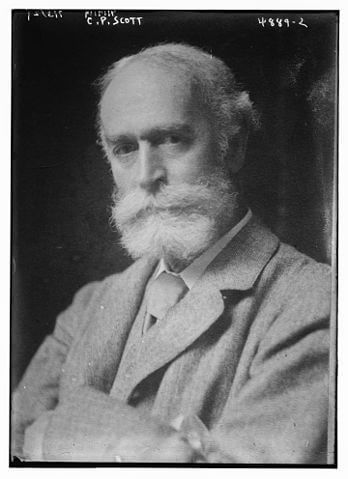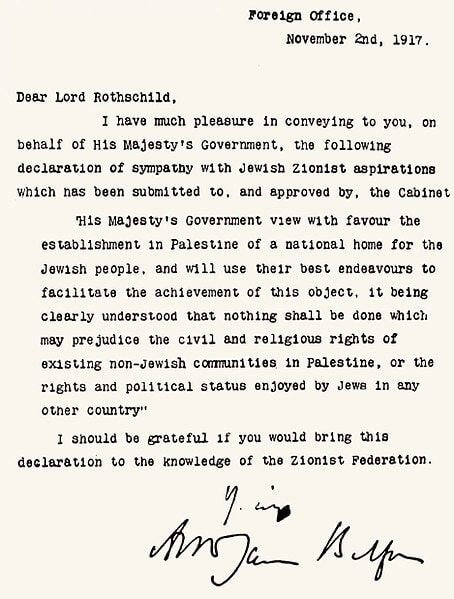November 2, 2017 marks the 100th anniversary of the Balfour Declaration, the public statement issued by the British government during World War I. Foreign secretary Arthur Balfour wrote to Lord Walter Rothschild announcing support for the establishment of a “national home for the Jewish people” in what was then the Ottoman region of Palestine. (You can read more about the history of the Balfour Declaration here.)
Today’s British government is preparing to officially commemorate the anniversary and Israeli PM Benjamin Netanyahu has confirmed his attendance in the UK for the celebrations.
Join the fight for Israel’s fair coverage in the news
Lord Rothschild’s descendant Jacob Rothschild writes in The Times of London (paywall):
That such a letter on behalf of the British government should have been written is surely one of the most surprising and improbable events in the history of mankind. Amazingly, after 3,000 years of civilisation and 2,000 years of persecution Jews would have a home in Palestine, providing the foundation stone for the state of Israel. My forebear, Lord Rothschild, to whom the letter was addressed, described it as “the most important moment in Jewish history in the last 1,800 years”. Chaim Weizmann, the first president of Israel, described it as “the Magna Carta of Jewish liberation”. Great Britain had given Jews the first external recognition of their right to a national revival in the land of their fathers.
The view from Israel haters and some other media, however, is decidedly less positive as they gear up to mark the Balfour Declaration.
The Guardian’s Ian Black publishes a feature-length article but cannot disguise where his sympathies lie:
That 1917 pledge – known to posterity as the Balfour declaration – had fateful consequences for the Middle East and the world. It paved the way for the birth of Israel in 1948, and for the eventual defeat and dispersal of the Palestinians – which is why its centenary next month is the subject of furious contestation.
Rather than see the Balfour Declaration as a commitment to Jewish self-determination, Black frames it as the origin of a conflict and the end of Palestinian aspirations.
In reality, it was not the Balfour Declaration that brought about the situation of today’s Palestinians or even those from 1948. Palestinian and Arab rejectionism has thwarted all attempts over the years to reach an amicable arrangement that could have seen a Palestinian state co-existing side by side with a Jewish one.
Black also writes:
The battle over Balfour has much in common with other disputes over historic apologies or redress for the wrongs of the past. It may be seen alongside recent rows over the Cecil Rhodes statues in Oxford and Cape Town and Confederate memorials in the US, compensation for British mistreatment of Mau Mau rebels in Kenya and French atonement for atrocities in Algeria. But the Israel-Palestine issue is far harder to deal with. Its past is not another country. Truth and reconciliation, let alone closure, are remote fantasies. Unlike slavery, apartheid, the Irish famine and western colonialism – all, at least formally, consigned to the dust heap of history – the Arab-Jewish conflict between the Mediterranean and the River Jordan shows no signs of fading. Indeed, it remains as bitter as ever, stuck in a volatile status quo of unending occupation and political deadlock.
Again, Black associates the Balfour Declaration with what he sees as historical wrongs or crimes, particularly of the colonialist variety. It is impossible not to relate to the British government’s support for Zionism within the context of the times. The Balfour Declaration stands out, however, not as an attempt to impose colonialism on an indigenous people, but to bestow national self-determination on a people who had an intimate historical, cultural and religious connection to the land for over 3,000 years.
What Black and The Guardian have tapped into is the narrative that seeks to delegitimize Israel’s very existence by associating it with an “original sin.”

Perhaps Black is trying to mitigate his own newspaper’s positive role in the Balfour Declaration, which, given The Guardian’s current disdain for Israel, is somewhat ironic. Dr, Azriel Bermant describes Chaim Weizmann’s friendship with C.P. Scott, the editor of The Manchester Guardian (later, The Guardian):
Weizmann’s relationship with Scott was vital in securing The Guardian’s support for Zionist aspirations in the months before the Balfour Declaration.’ In July 1929, on the occasion of Scott’s retirement as editor, Isidor Sandler of the Manchester Zionist Association wrote to him expressing gratitude ‘for the great part you have taken in the promulgation of the now famous Balfour Declaration…’ Scott’s response to Sandler was emphatic: ‘From the first day that I discussed the Zionist project with my old friend Dr. Weizmann I was convinced of its value not only for the Jewish people but for other nations as a connecting link between East and West.’
STRAIGHT FROM THE HORSE’S MOUTH

Back in the present day, who better than Manuel Hassassian, the official Palestinian representative to the UK, to make it clear what his campaign against the Balfour Declaration is really about in another story from The Guardian:
There has been a 100-year-long cover-up of Israel’s crimes: its ethnic cleansing of the majority of the Palestinian population in 1948; its unrelenting years of aggression and present brutal occupation.
Given that Israel has only existed for nearly 70 of the 100 years that Hassassian refers to, it appears that the issue is less about a territorial issue that arose in 1947-48 and everything to do with Palestinian rejection of Jewish rights going back way before the actual birth of the State of Israel.
Ultimately, the campaign against the Balfour Declaration and demands for an apology from the British government (which have been categorically rejected) are simply part of the wider delegitimization campaign against Israel. This latest focus on Balfour 100 will undoubtedly increase in the coming weeks.
Please send your considered comments to The Guardian – [email protected]
Featured image: Public domain via Wikimedia Commons with additions by HonestReporting



